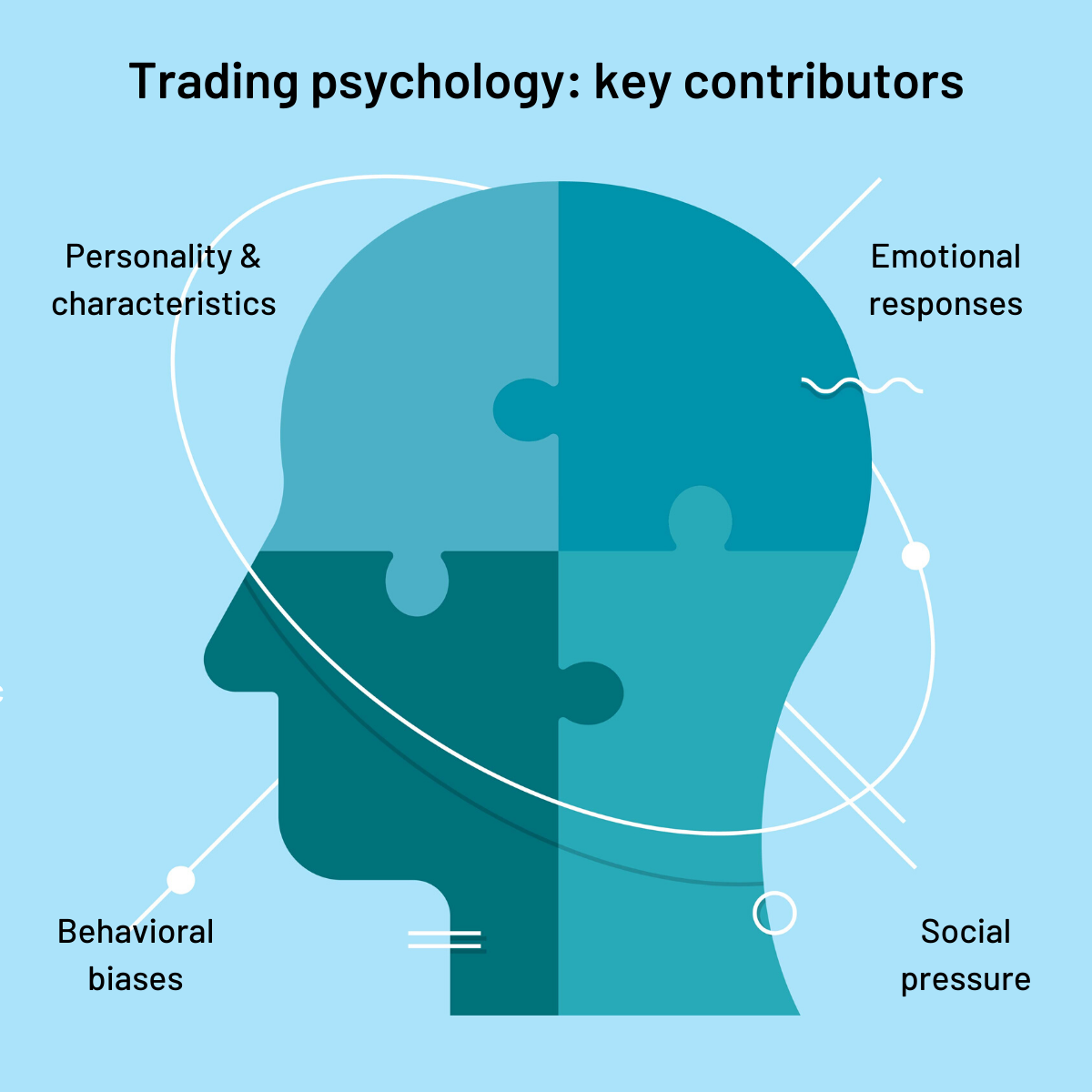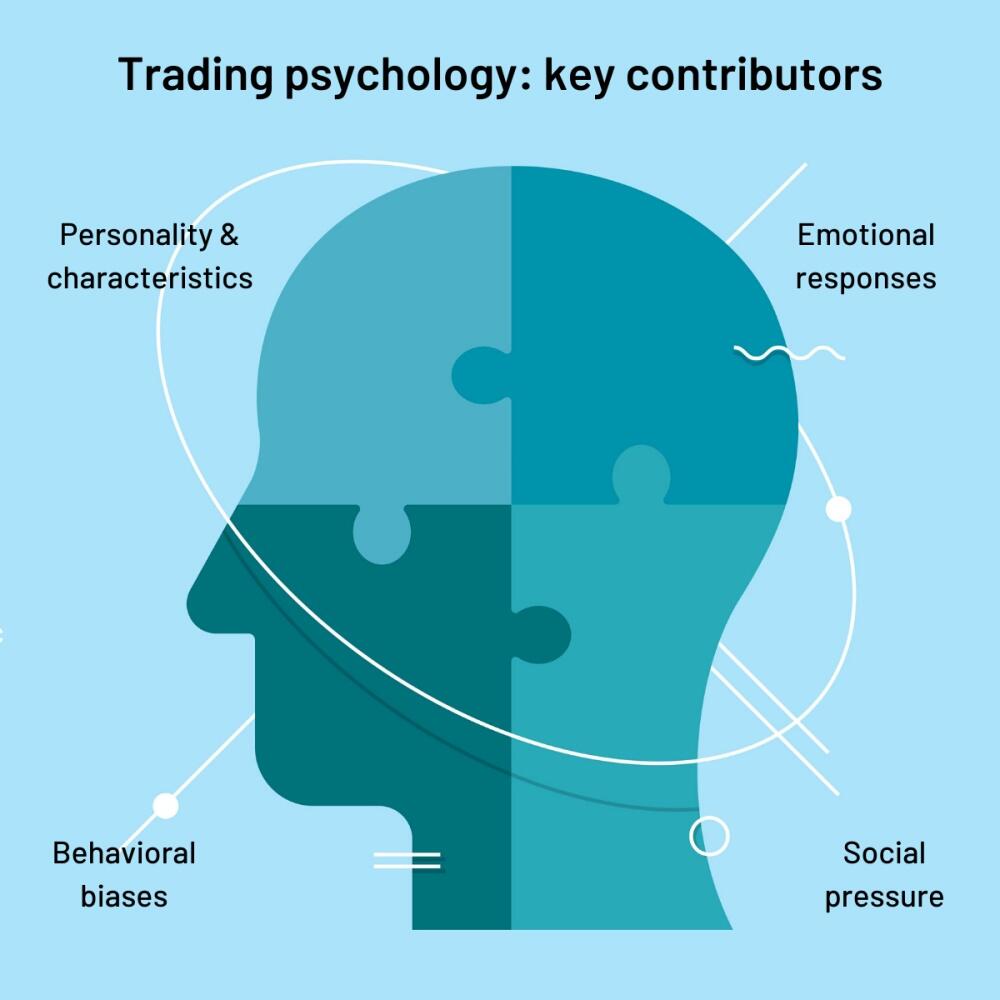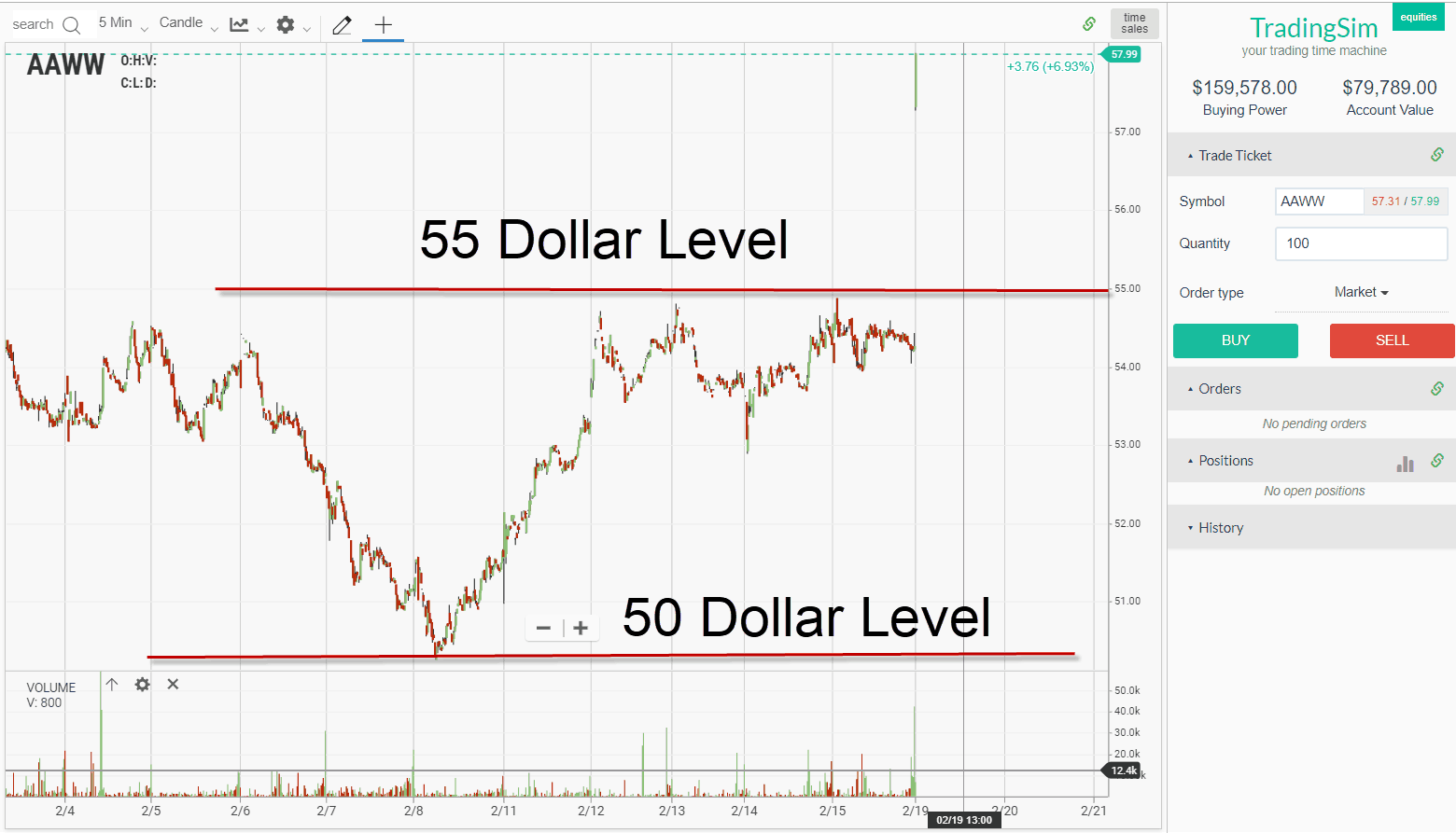Trading in financial markets is a mentally and emotionally demanding activity. The constant swings in prices, the uncertainty, and the potential for both significant gains and losses can take a toll on even the most experienced traders. Understanding the psychological challenges of trading and developing strategies to manage them is crucial for success in this field. This article will delve into the key psychological challenges faced by traders, including fear, greed, overconfidence, and the fear of missing out (FOMO). We will also discuss effective techniques for managing these challenges, such as mindfulness, emotional regulation, and risk management strategies. By addressing the psychological aspects of trading, traders can improve their decision-making, reduce stress, and increase their chances of achieving their financial goals.
The Psychological Landscape of Trading: Navigating the Emotional Rollercoaster
The Impact of Fear and Greed
Trading can be an emotionally charged activity, with fear and greed often acting as powerful driving forces. Fear can lead to hesitancy and missed opportunities, while greed can encourage overtrading and risky decisions.
| Challenge | Description | Management Strategies |
|---|---|---|
| Fear of Loss | The fear of losing money can lead to selling too early or holding on to losing trades for too long. |
|
| Greed | The desire to make more money quickly can lead to overtrading and taking on excessive risk. |
|
The Influence of Cognitive Biases
Cognitive biases are systematic errors in thinking that can negatively impact trading decisions.
| Bias | Description | Management Strategies |
|---|---|---|
| Confirmation Bias | The tendency to seek out and interpret information that confirms pre-existing beliefs. |
|
| Availability Heuristic | Overestimating the probability of events based on their salience or recency. |
|
| Hindsight Bias | The tendency to perceive past events as more predictable than they actually were. |
|
The Importance of Emotional Regulation
Emotional regulation is crucial for maintaining a healthy and sustainable trading approach.
| Challenge | Description | Management Strategies |
|---|---|---|
| Stress and Anxiety | The pressure and volatility of the market can lead to stress and anxiety. |
|
| Overconfidence | A false sense of security or overestimation of abilities can lead to excessive risk-taking. |
|
| Emotional Attachment | Attachment to specific trades or fear of missing out can lead to irrational decision-making. |
|
What is the psychological aspect of trading?

The Emotional Rollercoaster
Trading is a highly emotional activity, and understanding your own psychological tendencies is crucial for success. The market is constantly fluctuating, and this volatility can trigger a range of emotions, from excitement and euphoria to fear and anxiety. These emotions can cloud your judgment and lead to impulsive decisions, often resulting in losses.
- Fear of missing out (FOMO) can lead to chasing losing trades or entering positions without proper analysis.
- Greed can cause traders to hold onto losing positions too long, hoping for a rebound, or to take on excessive risk in pursuit of greater profits.
- Overconfidence can lead to making reckless trades based on gut feelings or ignoring risk management strategies.
Cognitive Biases
Beyond emotions, cognitive biases play a significant role in how traders interpret information and make decisions. These biases are systematic errors in thinking that can distort our perception of reality.
- Confirmation bias: Seeking out information that confirms pre-existing beliefs, while ignoring evidence that contradicts them.
- Anchoring bias: Over-relying on the first piece of information received, even if it’s irrelevant or inaccurate.
- Availability bias: Overestimating the likelihood of events that are easily recalled, often due to recent experiences or vivid memories.
Developing a Trading Mindset
Understanding the psychological aspects of trading is essential for developing a winning mindset. It’s about controlling your emotions, recognizing and mitigating cognitive biases, and building a strong trading plan.
- Self-awareness: Identifying your emotional triggers and how they affect your trading decisions.
- Discipline: Sticking to your trading plan, even when it’s difficult, and avoiding impulsive actions.
- Risk management: Setting clear stop-loss orders and managing your position size to limit potential losses.
- Continuous learning: Staying informed about market trends and developing your trading skills.
How do you handle psychology in trading?

Understanding Your Emotional Responses
Trading can be a highly emotional experience, and it’s crucial to understand how your emotions can affect your decision-making. Recognizing your emotional triggers, such as fear, greed, or excitement, is the first step. When you feel these emotions, try to step back and analyze the situation objectively rather than acting impulsively.
- Identify your emotional triggers. Pay attention to how you feel before, during, and after trades. What situations make you anxious or excited?
- Develop coping mechanisms. This could include taking breaks, practicing mindfulness, or journaling your emotions.
- Learn to detach yourself emotionally from your trades. Remember that every trade is not a win or lose situation, but an opportunity to learn and improve.
Developing a Trading Plan
A well-defined trading plan provides a framework for your trading decisions, reducing the impact of emotions. It helps you stay focused on your goals and avoid impulsive actions.
- Define your trading style and risk tolerance. Are you a scalper, day trader, or swing trader? How much risk are you comfortable taking?
- Set clear entry and exit points. Don’t let your emotions dictate your trading decisions. Have a plan for when to enter and exit a trade based on technical indicators or other criteria.
- Establish a risk management strategy. This includes setting stop-loss orders and managing your position size.
Maintaining Discipline and Consistency
Trading requires discipline and consistency. It’s easy to get caught up in the excitement of the market and deviate from your plan, but staying disciplined is essential.
- Stick to your trading plan. Don’t let emotions or market noise sway you from your strategy.
- Avoid overtrading. Give yourself time to analyze the market and make informed decisions.
- Learn from your mistakes. Every trade is a learning opportunity. Analyze your wins and losses to identify areas where you can improve.
How to overcome psychological barriers in trading?

Understanding your psychological biases
Trading involves a lot of emotions and psychological biases that can affect your decision-making. To overcome these barriers, you need to be aware of them and understand how they can influence your actions.
- Confirmation bias: This is the tendency to search for, interpret, favor, and recall information in a way that confirms or supports one’s prior beliefs. It can lead to ignoring valuable information that contradicts your trading strategy.
- Overconfidence bias: This occurs when traders overestimate their abilities and knowledge, leading to risky trades and ignoring potential losses.
- Fear of missing out (FOMO): This can lead to impulsive trading decisions as traders try to catch up on potential gains, often entering the market at unfavorable times.
- Anchoring bias: This involves overemphasizing the first piece of information received, making it difficult to adjust your expectations or exit a losing trade.
Developing a Trading Plan and Stick to It
A well-defined trading plan helps you stay disciplined and avoid impulsive decisions driven by emotions.
- Define your trading goals and risk tolerance: Clearly state your financial objectives and how much risk you are willing to take. This helps you make informed decisions about your trades.
- Establish entry and exit points: Determine specific price levels for entering and exiting trades based on your analysis and strategy, minimizing emotional reactions to market fluctuations.
- Set stop-loss orders: Use stop-loss orders to limit potential losses on your trades, preventing emotional attachment to a losing trade.
- Review your trades regularly: Analyzing your past trades can help you identify patterns of emotional decision-making and adjust your trading plan accordingly.
Managing Your Emotions and Stress
Trading can be stressful, so managing your emotions is crucial for making rational decisions.
- Practice mindfulness and meditation: These techniques can help you calm your mind and reduce emotional reactivity, allowing for more objective trading decisions.
- Maintain a healthy lifestyle: Adequate sleep, exercise, and a balanced diet contribute to a clear mind and better emotional control.
- Seek professional help: If you’re struggling to manage your emotions or trading decisions, don’t hesitate to consult a therapist or financial advisor.
- Take breaks: Stepping away from the market when you feel overwhelmed or stressed can help you regain perspective and avoid impulsive decisions.
What is psychological support in trading?

Psychological support in trading refers to the strategies and techniques traders use to manage their emotions and mental state while trading. This is crucial because trading involves a lot of risk and uncertainty, which can lead to emotional reactions that can affect decision-making and ultimately profitability.
The Importance of Psychological Support
Psychological support is essential for traders because it can help them:
- Avoid emotional trading: Emotional trading is when traders make decisions based on fear, greed, or other emotions, rather than on sound analysis. This can lead to poor decisions and losses.
- Stay disciplined: Trading requires discipline and patience. Psychological support can help traders stick to their trading plan and avoid impulsive actions.
- Maintain focus: Trading can be mentally taxing. Psychological support can help traders stay focused and avoid distractions.
Key Techniques for Psychological Support
Traders can use a variety of techniques to support their mental well-being while trading:
- Set realistic goals: Traders should set achievable goals and avoid chasing unrealistic profits. This can help to manage expectations and avoid disappointment.
- Develop a trading plan: Having a well-defined trading plan can provide a framework for decision-making and help traders stay on track.
- Manage risk: Risk management is critical to trading success. Traders should understand their risk tolerance and use appropriate strategies to manage their risk.
- Practice mindfulness: Mindfulness techniques, such as meditation or deep breathing, can help traders stay present and manage their emotions.
- Seek support: Traders can benefit from talking to a mentor, coach, or therapist to get support and advice.
Frequent questions
What are the most common psychological challenges traders face?
Traders face a variety of psychological challenges that can impact their performance and decision-making. Some of the most common include:
Fear of loss: This can lead to traders holding onto losing trades for too long in the hope that they will recover, or to avoid taking profits for fear of missing out on further gains.
Greed: This can lead to traders taking on excessive risk, chasing after big profits, and ignoring stop-loss orders.
Overconfidence: This can lead to traders making poor decisions based on their own assumptions and ignoring market signals.
Confirmation bias: This can lead to traders selectively seeking out information that confirms their existing beliefs, even if it is not accurate.
Emotional trading: This can lead to traders making rash decisions based on their emotions rather than on sound analysis.
How can I overcome the fear of loss?
Overcoming the fear of loss is a key step in becoming a successful trader. Here are some tips:
Develop a trading plan: This will help you stay disciplined and stick to your strategy, even when you are experiencing losses.
Set realistic goals: Don’t expect to get rich quick. Aim for consistent, small profits over time.
Use stop-loss orders: These will help you limit your losses on any given trade.
Don’t be afraid to take profits: It’s better to take a small profit than to hold onto a losing trade.
Focus on the long-term: Trading is a marathon, not a sprint. Don’t get discouraged by short-term losses.
How can I manage my emotions while trading?
Managing your emotions while trading is crucial for success. Here are some tips:
Recognize your emotions: Pay attention to how you are feeling and identify any triggers that might lead to impulsive decisions.
Practice mindfulness: This can help you stay calm and focused, even when the market is volatile.
Take breaks: Step away from the screen if you feel overwhelmed or stressed.
Seek professional help: If you are struggling to manage your emotions on your own, consider speaking to a therapist or counselor.
What are some strategies for dealing with overconfidence?
Overconfidence can lead to traders making reckless decisions and ignoring risk. Here are some strategies to combat overconfidence:
Keep a trading journal: This will help you track your performance and identify areas where you might be making mistakes.
Seek feedback from others: Get feedback from experienced traders or mentors on your trading strategy.
Be willing to admit your mistakes: Don’t be afraid to acknowledge when you are wrong and learn from your mistakes.
Don’t be afraid to ask for help: There is no shame in seeking help from a professional if you are struggling.



